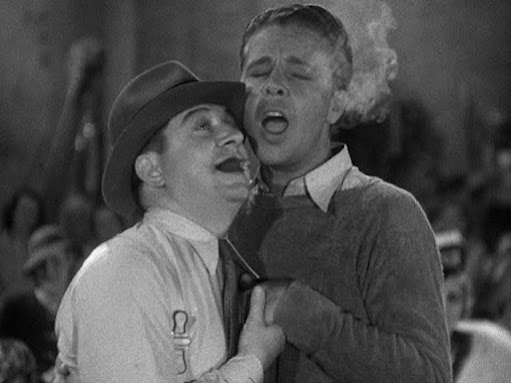"Things can never be the same now..."
When is a musical not a musical?
When Jon M. Chu (director of Step Up 2 in 2008) tried to describe his film to an interviewer in 2019, he coined the term dancical (a musical with dances rather than songs).
Sidestepping the minor point that the most memorable musicals ever filmed have featured quite spectacular dance sequences...
...it is revealing that Chu was so reluctant to refer to his film (or presumably the rest of the "Step Up" franchise) as a musical. It's possible of course that he was afraid "musical" might conjure up some unwanted preconceptions with the film's target demographic, but I tend to think there was something deeper going on here.
There is an argument to be made that the Step Up movies are not musicals, insofar as the characters never actually break into spontaneous song (or dance) at a moment's notice (well... hardly ever... but we'll deal with that when the time comes). They are films about dancers, and so there is a lot of dancing in the films. You could probably call them "meta-musicals". I'm sure someone already has.
I mention this now because our next film is 42nd Street which is exactly as much of a musical as any of the Step Up films.
42nd Street was released in 1933, and tells the story of a group of Broadway professionals as they struggle to put on a new show in the middle of the Depression. To call this film iconic is a masterpiece of understatement; it became the template for every subsequent "let's-put-on-a-show" style musicals of the next ninety years (and counting).
What is ironic about 42nd Street is that it's actually quite a serious drama about the sweat and grind that goes into the creation of a Broadway musical. It also makes no attempt to hide from the social reality of the Great Depression. I have been talking lately about Depression/Comedy but 42nd Street is a "Depression/Musical". If anyone wanted to describe a genre as Musical Noir, 42nd Street would take pole position.
Ultimately of course fretting about what to call films like these is really a waste of energy. Call them "musicals"; call them "meta"; call them "Mr. Tibbs" if you wish. Arguing about terminology just gets you side-tracked into a debate about Semantics.
I have no wish to come across as anti-semantic (some of my best friends...) but 42nd Street (and the subsequent Busby Berkeley films) do not need to be labelled. They are exactly what they strive to be, and arguing over their pronouns (so to speak) does nothing to alter their identity.
They tell compelling stories that acknowledge the social conditions of the time without beating you over the head, and they feature spectacular musical numbers that are like nothing anyone had ever seen at that point.
They are also emphatically pre-Code, in the sense that they were released prior to the imposition of the Hays Office censorship restrictions on Hollywood films. The songs (by Harry Warren and Al Dubin) are extremely risqué; "You're Getting to be a Habit With Me" couches a love affair in the terminology of drug addiction, while "Shuffle off to Buffalo" is essentially about a newly-married girl losing her virginity.
Warren & Dubin wrote the songs for all of Busby Berkeley's Warner Brothers films and the songs are not just infectious, they are positively virulent. Lots of popular songs are catchy, but the songs in these films are practically a pandemic. So be warned: they will be bouncing around your head for the rest of the week, whether you want them to or not...
42nd Street was released in March of 1933, and it was successful enough (both commercially and critically) that Warner Brothers followed it with Gold Diggers of 1933 and Footlight Parade (both released later that same year).
We'll be getting to those films in due course (along with more Step Up instalments) but first we will screen 42nd Street at 7.30 on Thursday, the 20th of June at the Victoria Park Baptist Church.













Comments
Post a Comment